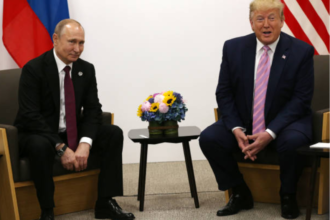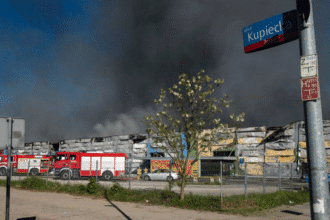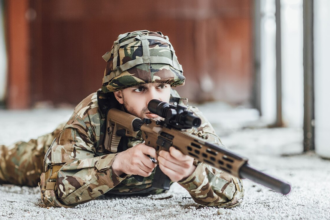Prince William is visiting the Baltic country for two days in order to demonstrate his support for UK soldiers stationed in Estonia. His visit underlines the UK’s dedication to NATO and initiatives for deterrence against Russian aggression. The Prince William Estonia Visit seeks to reassure NATO members of the UK’s commitment to regional security and therefore build relationships.
As part of a multinational group assigned to guard NATO’s eastern border, the Prince of Wales will see soldiers training. Maintaining stability in the area among rising geopolitical tensions depends on this factor in great part. For the troops stationed there, his presence motivates them morally and gives a clear message of togetherness and readiness to enemies.
Prince William's visit has what on the agenda?
The Prince William from Estonia Visit starts on Thursday morning at Tallinn with a meeting with Alar Karis, President of Estonia. Prince William will then visit a school teaching immigrants from the continuing conflict in Ukraine.
About 900 UK troops—including members of the Mercian Regiment—of which Prince William is colonel-in-chief are stationed in Estonia. His visit emphasizes their importance and the UK’s consistent backing of its friends in Eastern Europe. His presence emphasizes the need of military cooperation and readiness as tensions rise all around the area.
Apart from ceremonial gatherings, Prince William is supposed to interact with troops on the field, appreciating their efforts in safeguarding NATO’s eastern borders and hearing to their stories. His visit offers a chance to strengthen military and diplomatic connections as well as to learn about the difficulties personnel sent to Estonia experience.
In what way is Estonia handling the security concerns?
The backdrop of this tour is growing tensions between Russia and its surrounding nations. Estonia recently withdrew from a treaty prohibiting anti-personnel landmines, therefore indicating a change in defense strategy. Its navy has also been aggressively trying to stop underwater cable sabotage, an absolutely vital component of national security.
With an eye toward allocating 5% of its GDP to defense expenditure, Estonia is also greatly raising its military budget. This captures the country’s increasing worries about possible Russian attack and its will to strengthen its security capacity. Given Russia’s erratic behavior in the area, Estonia’s increased security policies seem like required protection.
What message the Royal Visit delivers?
Considered as a royal soft power display, the Prince William Estonia Visit supports UK solidarity with Estonia and other Baltic nations. This comes just months following Sir Keir Starmer’s visit to the United Kingdom, so strengthening diplomatic relations between the two countries.
For the people of Estonia, the trip is a comforting indication that Western allies still pledge allegiance to their protection. Speaking at the University of Tallinn, staff and students expressed gratitude for the visit as seen as a vital gesture of solidarity. Prince William’s participation also represents the strategic need of the UK in preserving NATO unity and guaranteeing the security of its Eastern European allies.
About the Russian threat, how do Estonians feel?
Many Estonians perceive more vulnerability because of their proximity to Russia. Senior lecturer cybersecurity Catlyn Kirna underlined the ongoing cyberattacks and disinformation activities started from Russia.
We are essentially getting ready for war, she remarked.
The unknown future of Ukraine just fuels further worries. Catlyn said, “If Ukraine falls, we will have to fight for our lives,” noting that the matter is quite personal and particularly relevant given her son is eighteen years old.
Student of political science Julija Raudkivi also expressed worries about NATO’s survival, especially in view of earlier remarks made by former U.S. President Donald Trump.
“[US] President Trump’s comments and actions caused anxiety for many Estonians,” she stated.
His seeming mistrust of NATO has begged problems regarding the dependability of the alliance, hence fueling citizen concerns. “Underlying fear about the threat Russia presents is absolutely present. It’s proximity; we are rather close. Julija said.
How do the young people of Estonia respond?
Many young Estonians back more military expenditure and more potent NATO forces. Julija thinks the present geopolitical environment calls for these actions.
“You feel as though war is just behind the door since Russia’s attack on Ukraine,” she remarked.
For Sharon Kaasik, a student of arts and music, the background of Soviet control is really significant. Having grown up listening to tales of life before Estonia’s 1991 independence, she worries about returning to those terrible years. She does, however, rely on military ties and dream of more European nation collaboration.
Twenty-one-year-old arts and music student Sander Poldmaa has been proactive by serving in Estonia’s defense forces.
“We’re a small nation and Russia is right beside us,” he remarked.
Sander further attacked Trump’s contempt of NATO, labeling his behavior “childish.” He emphasizes the need of deterrence even while he hopes for a better NATO.
“The main point for me is that I want the war to never start,” he remarked. Still, we must be able to protect ourselves.
Many young people in Estonia believe they have an intense obligation to get ready for any possible conflict. Although they still hope that conflict might be avoided, they understand the need of being able to protect their country should the necessity develop.
How does Estonia help Ukraine with defense?
Four times as much as the UK, Estonia has given Ukraine based on GDP more help than any other nation. This captures the great awareness of the country about the danger that Russian expansionism presents.
One of the biggest voices supporting further Western military help to Kyiv as the war in Ukraine persists is Estonia. To further its dedication to regional security, the nation has sent armaments, humanitarian relief, and intelligence support. Fearing that delay would empower Moscow even more, Estonian officials have pushed NATO members to adopt a strong posture against Russian aggression on several times.
The worries of Estonians act as a sobering reminder of how urgent and real the security situation is for those living on NATO’s front line as the cool spring sunshine highlights Tallinn.
Catlyn Kirna stated, capturing the seriousness of the matter for Estonia and its people, “For us, it’s the end of the world.” The Prince William Estonia Visit is a potent emblem of the UK’s consistent support of its NATO partners.
How might the Prince William Estonia Visit affect future relations?
The visit of Prince William is expected to deepen military and diplomatic relations between the United Kingdom and Estonia. The conversations he had on his trip will probably open the path for more strategic cooperation including intelligence sharing and combined military training events.
His visit emphasizes also the need of NATO’s unity in confronting outside challenges. Prince William’s attendance reminds us that NATO’s eastern flank stays a top concern for Western allies by supporting the UK’s dedication to Estonia and the wider Baltic area.
Given the region’s continuous tensions, Estonia and its NATO allies will keep developing a strong defense plan. Visits like these help to confirm ties and make sure that small but strategically important countries like Estonia do not stand alone in the face of possible hazards as global geopolitics change.
The Prince William Estonia Visit left a legacy of togetherness, resiliency, and the common will to preserve peace and security in Europe.








